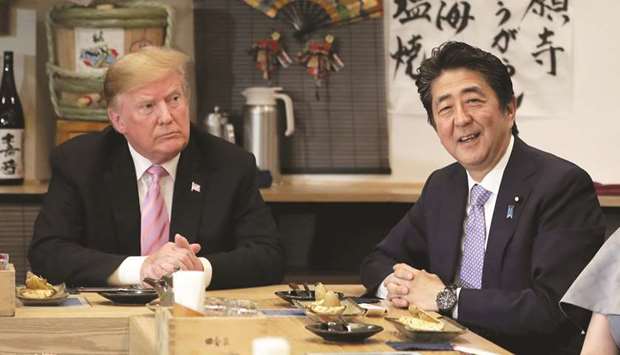President Donald Trump golfed, attended a Sumo wrestling match and ate dinner with Japanese Prime Minister Shinzo Abe at a hibachi restaurant. But the real business starts today as the two leaders sit down in an attempt to resolve tensions over trade and defence ties.
Trump acknowledged yesterday a trade deal wouldn’t occur during the trip, saying that nothing would be finalised until after Japan’s elections in July. While Trump and Abe spent much of the day together, trade negotiators have been meeting separately to hammer out a deal after Trump threatened to raise auto tariffs.
“The prime minister and I talked a lot today about trade and military and various other things,” Trump told reporters before dinner with Abe. “And I think we had a very productive day, and tomorrow likewise would be a very productive day.”
Trump and Abe spent about 2 1/2 hours golfing before attending Japan’s Summer Grand Sumo Tournament, where he awarded the winner with a four-foot trophy he commissioned. They’ll meet one-on-one and have a working lunch today, and Trump will also become the first foreign leader to meet Japan’s new emperor.
Japan is seeking to stay in Trump’s good graces in order to avoid costly tariffs and retain positive relations with an ally that ensures its security against the likes of China and North Korea. Abe has reportedly sought to play a mediator role in increasing tensions between the US, North Korea and Iran.
The two countries still have differences on trade and agreed “to work to get a deal done quickly,” Japan Economy Minister Toshimitsu Motegi said on Saturday after almost three hours of discussions with US Trade Representative Robert Lighthizer in Tokyo.
They didn’t discuss contentious issues such as US threats to restrict Japanese car exports and applying a currency clause, Motegi said.
Japan will hold elections for the upper house in July, and many have predicted the government will take the opportunity to dissolve the more powerful lower house at the same time. It will be politically difficult for Abe to concede anything, particularly on agriculture, ahead of the vote.
Trump, meanwhile, is looking to strike a deal to help his re-election bid next year. With his trade war against China escalating, the US president is looking to open up new markets for farmers hurt by increased tariffs. Yet that may be tough if he also insists on curbing imports of Japan-made cars and parts.
Trump’s four-day trip will also include a visit to one of the two biggest warships Japan has built since World War II. That will give Abe a chance to emphasise that his government spending more on US military equipment, particularly as Trump is said to be preparing to seek more money from Japan for hosting American troops.
“Japan is doing very large orders, and we appreciate that, and we think it’s probably appropriate right now with everything that’s going on,” Trump said in a meeting with business leaders on Saturday. “The world is changing.”
Yesterday morning, Trump and Abe played golf at the Mobara Country Club along with Japanese professional golfer Isao Aoki. Later, the two leaders entered the Ryogoku Kokugikan sumo hall to a cheering crowd of more than 11,000 people.
“It was something to see, these great athletes, because they really are athletes,” Trump said of the sumo match. “It’s a very ancient sport. And I’ve always wanted to see sumo wrestling. So it was really great.”
Some traditions were adapted for Trump. Rather than sitting on traditional cushions, chairs were built into a platform to give him more back support.
The two countries still had differences and agreed to work to close the gaps, Japan Economy Minister Toshimitsu Motegi said after nearly three hours of discussions with US Trade Representative Robert Lighthizer on Saturday in Tokyo.
They didn’t discuss contentious issues such as US threats to restrict Japanese car exports and applying a currency clause, Motegi said. “We agreed to work to get a deal done quickly.”
Japan this month lifted longstanding restrictions on some US beef, allowing products from all cattle to enter the Asian nation for the first time since 2003. Japan banned US beef after a case of mad cow disease was found in Washington in December 2003 and restored partial access two years later while prohibiting products from older animals.
Trump this month declared that imported cars represented a threat to US national security but announced a six-month delay in imposing new tariffs on imported vehicles and parts from Japan and other nations in order to pursue negotiations. He wants to cut the US trade deficit with Japan.
At a dinner with Japanese business leaders Saturday, Trump sought out one who had recently criticised the US leader.
Akio Toyoda, president of Toyota Motor Corp, was among Japan’s top executives who met Trump soon after he arrived in Japan. Earlier this month, Toyoda rebuked Trump’s declaration that imported cars and components threaten US national security, saying it sent a message to Toyota that its decades of investment in the US isn’t welcomed.
In pre-dinner remarks at the US ambassador’s residence in Tokyo, Trump asked “where’s Toyota?”
“There’s nothing like the boss,” Trump said after people pointed out Toyoda in the crowd. “I thought that was you.”

US President Donald Trump talks with Japanese Prime Minister Shinzo Abe during a dinner in Tokyo. Trump acknowledged yesterday a trade deal wouldn’t occur during the trip, saying that nothing would be finalised until after Japan’s elections in July.
